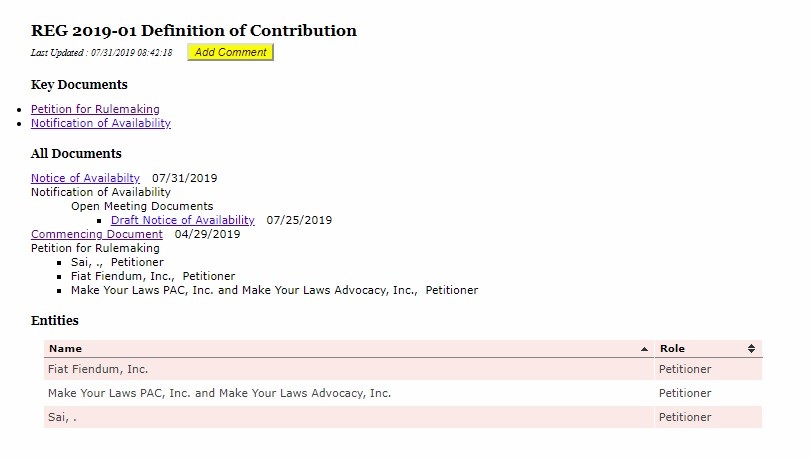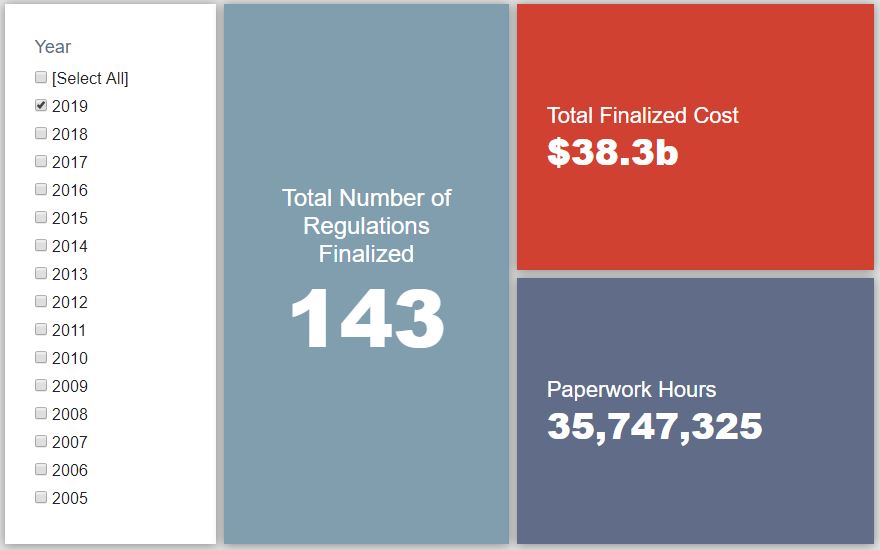Week in Regulation
August 5, 2019
Regulation of Toxic Chemicals Leads the Week
Outside of an Environmental Protection Agency (EPA) proposed rule dealing with certain chemicals, it was a pretty ho-hum week. The EPA proposal brings roughly half a billion dollars in total costs, but the rest of last week’s rulemakings accounts for only $20 million in net savings. Across all proposed and final rules, agencies published $481.3 million in total net costs but cut 109,136 hours of paperwork.
REGULATORY TOPLINES
- New Proposed Rules: 60
- New Final Rules: 66
- 2019 Total Pages: 37,883
- 2019 Final Rule Costs: $38.3 Billion
- 2019 Proposed Rule Costs: -$1.8 Billion
TRACKING THE REGULATORY BUDGET
EPA published a proposed rule regarding the “Regulation of Persistent, Bioaccumulative, and Toxic Chemicals Under TSCA Section 6(h).” The proposal seeks to update the restrictions on the “manufacture (including import), processing, and distribution” of a series of chemicals. According to EPA’s estimates, this could yield approximately $502 million in total costs (or $43.1 million per year when annualized with a 7 percent discount rate) to industry. Since it is still a proposed rule, however, these costs do not affect the fiscal year (FY) 2019 regulatory budget under Executive Order (EO) 13,771. With only two months lefts in FY 2019, this will likely fall under the FY 2020 ledger.
So far in FY 2019 (which began on October 1, 2018), there have been 55 deregulatory actions (per the rubric created by EO 13,771 and the administration’s subsequent guidance document) against 30 rules that increase costs and fall under the EO’s reach. Combined, these actions yield quantified net costs of roughly $11.4 billion. This total, however, includes the caveat regarding the baseline in the Department of Agriculture’s “National Bioengineered Food Disclosure Standard.” If one considers that rule to be deregulatory, the administration-wide net total is approximately $4.7 billion in net costs. The administration’s cumulative savings goal for FY 2019 is approximately $18 billion.
THIS WEEK’S REGULATORY PICTURE
This week, the Federal Election Commission (FEC) considers a petition to update its definition of a contribution following fallout from the 2016 presidential election.

Unless you have been living (perhaps blissfully) under a rock since early 2017, you are probably aware that a major part of a well-publicized investigation centered on whether the Donald Trump campaign was offered or accepted information on the Hillary Clinton campaign from foreign individuals. A lesser part of that discussion is whether accepting information on political opponents constitutes a campaign contribution.
In April, the FEC received a petition asking that it explicitly state that valuable information is considered a contribution and must be reported to the FEC. This week, the FEC published a notice in the Federal Register asking for public comment on the substance of the petition.
If the petition is adopted as written, the FEC would define “valuable information” as information that: 1) is not freely available to the public; 2) is provided to a candidate or campaign at a cost less than the market rate or by a person not hired by the recipient to generate such information; (3) would cost a non-trivial amount; and (4) would likely influence any election for federal office.
The FEC would also establish two types of valuable information — foreign information and compromising information. Recipients of such information would be required to report it to, and share it with, the FEC within three days. The FEC would then automatically initiate an investigation and, perhaps most importantly, alert the Federal Bureau of Investigation. The FEC would also keep any compromising information sealed.
The FEC is accepting public comment until September 30, 2019.
TOTAL BURDENS
Since January 1, the federal government has published $36.5 billion in net costs (with $38.3 billion in finalized costs) and 42.6 million hours of net paperwork burden increases (with 35.7 million coming from final rules). Click here for the latest Reg Rodeo findings.












